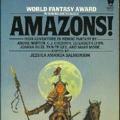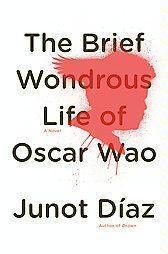Review of 'The Brief Wondrous Life of Oscar Wao' on 'Goodreads'
4 stars
"The brief, wondrous life of Oscar Wao" is a political history, disguised as a family history, disguised as a coming-of-age novel. While we are lead to believe in the first few pages that we are only going to read about Oscar's quest for love (well, sex more likely), through many background chapters, we read about his family's life beneath the horrible reign of the Dominican dictator Trujillo, and through the many footnotes we read about the history of the Dominican Republic.
His regime is described with metaphores borrowed from pretty much all the facets of nerd culture (games (the video AND tabletop kind), anime, sf&f literature, comic books, etc), which was a lot of fun for me. Oscar and I shared a taste in books, haha! Also, nice for once that the references are to something I know a lot about, or at least more than obscure old literature, and ancient history.
I enjoyed the prose. The narrator spoke in a colloquial voice, funny, sarcastic and streetwise. His lines were peppered with spanish words, most of which I could decipher through my very basic knowledge of spanish, context, and some help from the dictionairy in the back. Not all words were included in the dictionairy, which was a bit frustrating though. I'd actually have preferred it if he let the dictionairy out, and just let me figure things out from context, instead of constantly flipping to the last pages, only to find out the word is not included. I read somewhere though, that this mish mash of languages was meant to reflect the immigrant experience , which it certainly did. I see a lot of people in the reviews complaining about this, and I wonder, how many of them would be bilingual? As someone who speaks both Dutch and English, this wasn't my first time reading a book were I constantly have to just guess words from context. It actually reminded me of when I first started reading books in English, and occasionally only understanding 80% of the text on a page was to be expected. Or reading older Dutch literature, that often included lines in Latin, French and German, because at the time it was written most educated people were pretty fluent in those languages. So, all in all, I didn't mind that much.
At first, the narrator comes across as the omniscient kind, or maybe Diaz himself, but after a while we realize he is one of the characters in the book, which puts everything he says in a different context. It is now a lot clearer how much of an unreliable narrator he actually is. Not all characters in this book are likeable, narrator and title character included. However, they are not unsympathetic, and you get where the unlikeableness comes from. Both the narrator as Oscar, for instance, are obsessed with sex, and see getting sex as essential to their manhood. (Only difference is, the narrator is succesful, Oscar isn't) This seems a natural outcome from the culture they grew up in, at least, as Diaz tells it. After all, on one of the first pages we already read how strongly romantic behaviour is encouraged in the young Oscar, and how as toddler, he is already pushed to dance and flirt with girls. However, the importance that both characters place on sex doesn't exactly help them. Oscar gets killed because of it and the narrator ruins a relationship that's very important to him with his constant cheating.
As a character, Oscar is occasionally painfully relatable. After all, I too was an insecure nerd in high school, convinced that I'd die unloved. Still remembering how hopeless that felt, it made me really feel sympathetic to how much longer Oscar walked around feeling like that, and unable to throw this burden off, like I eventually did. He's also really frustating, though. The way he not only wallows in self-pity, but also ignores Yunior's (really good!) advice, and refuses to even consider dating any girl who is not incredible beautiful, despite his own imperfections made me occasionally want to scream at him. Still, when a character inspires those kinds of strong reactions, I usually take it as a good sign.
Most of the story of Trujillo´s dictatorship is told through the footnotes, which I really enjoyed. I always like a creative use of footnotes, and this certainly was. The tragedy and magical realism that entered the story through this interwoven narrative, helped give a larger context to Oscar´s story (that would otherwise probably mostly would have come across as a guy whining that he can't get laid) and his family incredibly bad luck in love. The sexual-predatorness of Trujillo is also, just like the narrator's story a contrast for Oscar. The female characters in the story, especially Jacquelyne's and Beli's story showed another side of the story, namely what effect this unbridled lust has on the women that have to deal with it.
All in all, I enjoyed this book. It was actually kind of a page turner for me, and the light and funny prose made it an easy read. The characters though, were my favourite part. No, they weren't always likeable, but they seemed very real (if sometimes kind of terrible) people. Their motivations were always clear to me, which made their decisions (even the ones that made me bite my nails in agony over how dumb they were) feel natural. I'd recommend it if you are interested in the history of the Dominican Republic, or like post-modern literature. I wouldn't recommend it if a "Nice Guy"-character would fill you with rage and annoyance. (Because, yes, Oscar is very much a Nice Guy, and probably a creep, just, also a person. With a history, and circumstances that made him who he is. He isn't a one-dimensional stereotype that the reader can just hate one, which might be why so many readers seem to find him annoying.)

